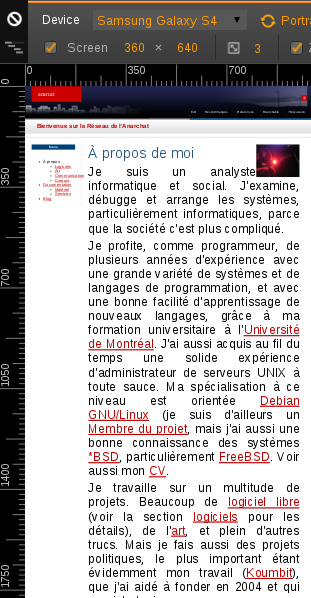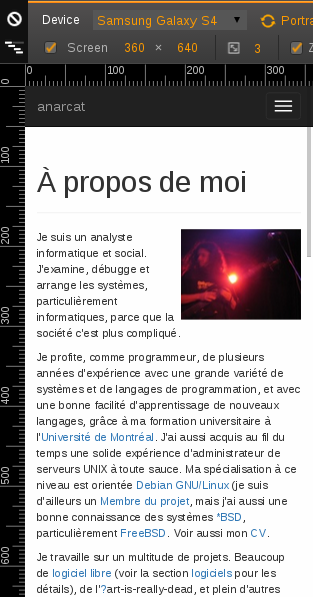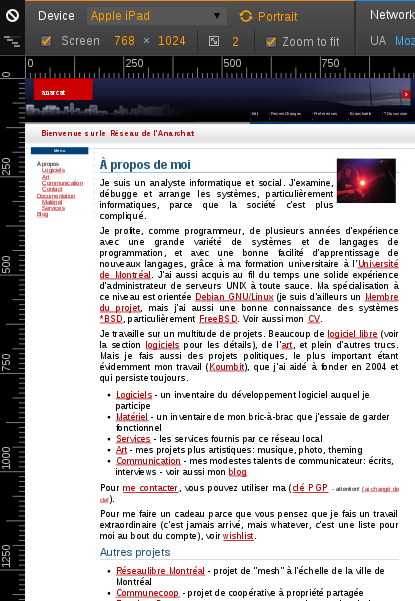Chris Lamb: Free software activities in March 2017
 Here is my monthly update covering what I have been doing in the free software world (previous month):
Here is my monthly update covering what I have been doing in the free software world (previous month):
- Fixed two issues in try.diffoscope.org, a web-based version of the diffoscope in-depth and content-aware diff utility:
- Made a number of improvements to travis.debian.net, my hosted service for projects that host their Debian packaging on GitHub to use the Travis CI continuous integration platform to test builds on every code change) travis.debian.net, including:
- Fixed an issue in django-staticfiles-dotd, my Django staticfiles adaptor to concatentate .d-style directories, where some .d directories were being skipped. This was caused by modifying the contents of a Python list during iteration. (#3)
- Performed some miscelleanous cleanups in django12factor, a Django utility to make projects adhere better to the 12-factor web-application philosophy. (#58)
- Submitted a pull request for Doomsday-Engine, a portable, enhanced source port of Doom, Heretic and Hexen, to make the build reproducible (#16)
- Created a pull request for gdata-python-client (a Python client library for Google APIs) to make the build reproducible. (#56)
- Authored a pull request for the MochaJS JavaScript test framework to make the build reproducible. (#2727)
- Filed a pull request against vine, a Python promises library, to avoid non-determinstic default keyword argument appearing in the documentation. (#12)
- Filed an issue for the Redis key-value database addressing build failures on the MIPS architecture. (#3874)
- Submitted a bug report against xdotool a tool to automate window and keyboard interactions reporting a crash when searching after binding an action with behave. (#169)
- Reviewed a pull request from Dan Palmer for django-email-from-template, a library to send emails in Django generated entirely from the templating system, which intends to add an option to send mails upon transaction commit.
- Submitted the following patches to fix reproducibility-related toolchain issues within Debian:
- Categorised a large number of packages and issues in the Reproducible Builds notes.git repository.
- I also submitted 12 patches to fix specific reproducibility issues in archvsync, dask.distributed, doomsday, eric, fritzing, golang-github-go-macaron-toolbox, neutron, node-mocha, ns2, python-gdata, qtltools & vine.
- Worked on publishing our weekly reports. (#96, #97, #98, #99 & #100)
I also made the following changes to our tooling:
diffoscope is our in-depth and content-aware diff utility that can locate and diagnose reproducibility issues.
- New features/optimisations:
- Extract squashfs archive in one go rather than per-file, speeding up ISO comparison by ~10x.
- Add support for .docx and .odt files via docx2txt & odt2txt. (#859056).
- Add support for PGP files via pgpdump. (#859034).
- Add support for comparing Pcap files. (#858867).
- Compare GIF images using gifbuild. (#857610).
- Bug fixes:
- Ensure that we really are using ImageMagick and not the GraphicsMagick compatibility layer. (#857940).
- Fix and add test for meaningless 1234-content metadata when introspecting archives. (#858223).
- Fix detection of ISO9660 images processed with isohybrid.
- Skip icc tests if the Debian-specific patch is not present. (#856447).
- Support newer versions of cbfstool to avoid test failures. (#856446).
- Update the progress bar prior to working to ensure filename is in sync.
- Cleanups:
- Use /usr/share/dpkg/pkg-info.mk over manual calls to dpkg-parsechangelog in debian/rules.
- Ensure tests and the runtime environment can locate binaries in /usr/sbin (eg. tcpdump).
strip-nondeterminism is our tool to remove specific non-deterministic results from a completed build.
- Fix a possible endless loop while stripping .ar files due to trusting the file's own file size data. (#857975).
- Add support for testing files we should reject and include the filename when evaluating fixtures.
buildinfo.debian.net is my experiment into how to process, store and distribute .buildinfo files after the Debian archive software has processed them.
- Add support for Format: 1.0. (#20).
- Don't parse Format: header as the source package version. (#21).
- Show the reproducible status of packages.
- "Frontdesk" duties, triaging CVEs, etc.
- Issued DLA 848-1 for the freetype font library fixing a denial of service vulnerability.
- Issued DLA 851-1 for wget preventing a header injection attack.
- Issued DLA 863-1 for the deluge BitTorrent client correcting a cross-site request forgery vulnerability.
- Issued DLA 864-1 for jhead (an EXIF metadata tool) patching an arbitrary code execution vulnerability.
- Issued DLA 865-1 for the suricata intrusion detection system, fixing an IP protocol matching error.
- Issued DLA 871-1 for python3.2 fixing a TLS stripping vulnerability in the smptlib library.
- Issued DLA 873-1 for apt-cacher preventing a HTTP response splitting vulnerability.
- Issued DLA 876-1 for eject to prevent an issue regarding the checking of setuid(2) and setgid(2) return values.
- python-django:
- 1:1.10.6-1 New upstream bugfix release.
- 1:1.11~rc1-1 New upstream release candidate.
- redis:
- 3:3.2.8-2 Avoid conflict between RuntimeDirectory and tmpfiles.d(5) both attempting to create /run/redis with differing permissions. (#856116)
- 3:3.2.8-3 Revert the creation of a /usr/bin/redis-check-rdb to /usr/bin/redis-server symlink to avoid a dangling symlink if only the redis-tools package is installed. (#858519)
- gunicorn 19.7.0-1 & 19.7.1-1 New upstream releases.
- adminer 4.3.0-1 New upstream release.
- cpio (2.12+dfsg-4) Add missing autoconf to Build-Depends (#855572)
- pygoocanvas (0.14.1-1.2) Make the build reproducible (#828222), add docbook-xml to Build-Depends (#628813), re-add demo files (#450577), and update URL in debian/copyright (#693270).
- ucspi-tcp (1:0.88-3.1) Make the build reproducible (#777020, #847036).
- ca-certificates: Contains untrusted StartCom and WoSign certificates.
- python-kombu: Missing build-depends on python-vine
- devscripts: Please document Github's disparity between "tags" and "releases" re. Git submodules in uscan.
- mkchromecast: Documentation incorrectly refers to "python mkchromecast.py".
- spice-gtk: Spice-controller.h not always built from source.
- xdotool: Crashes when searching after binding with "behave".
- shadow: Please run the testsuite.
- libcanberra: Documentation not always generated from source.
 And, for those of you who don t know: uberspace is a shared hoster that basically just gives you an SSH shell account, directories for you to drop files in for the http server, and various tools to add subdomains, certificates, virtual users to the mailserver. You can also run your own custom build software and open ports in their firewall. That s quite cool.
I m considering migrating the blog away from wordpress at some point in the future having a more integrated experience is a bit nicer than having my web presence split over two sites. I m unsure if I shouldn t add something like cloudflare there I don t want to overload the servers (but I only serve static pages, so how much load is this really going to get?).
in other news: off-site backups
I also recently started doing offsite backups via borg to a server operated by the wonderful
And, for those of you who don t know: uberspace is a shared hoster that basically just gives you an SSH shell account, directories for you to drop files in for the http server, and various tools to add subdomains, certificates, virtual users to the mailserver. You can also run your own custom build software and open ports in their firewall. That s quite cool.
I m considering migrating the blog away from wordpress at some point in the future having a more integrated experience is a bit nicer than having my web presence split over two sites. I m unsure if I shouldn t add something like cloudflare there I don t want to overload the servers (but I only serve static pages, so how much load is this really going to get?).
in other news: off-site backups
I also recently started doing offsite backups via borg to a server operated by the wonderful  I m proud (yes, really) to announce DNS66, my host/ad blocker for Android 5.0 and newer. It s been around since last Thursday on F-Droid, but it never really got a formal announcement.
DNS66 creates a local VPN service on your Android device, and diverts all DNS traffic to it, possibly adding new DNS servers you can configure in its UI. It can use hosts files for blocking whole sets of hosts or you can just give it a domain name to block (or multiple hosts files/hosts). You can also whitelist individual hosts or entire files by adding them to the end of the list. When a host name is looked up, the query goes to the VPN which looks at the packet and responds with NXDOMAIN (non-existing domain) for hosts that are blocked.
You can find DNS66 here:
I m proud (yes, really) to announce DNS66, my host/ad blocker for Android 5.0 and newer. It s been around since last Thursday on F-Droid, but it never really got a formal announcement.
DNS66 creates a local VPN service on your Android device, and diverts all DNS traffic to it, possibly adding new DNS servers you can configure in its UI. It can use hosts files for blocking whole sets of hosts or you can just give it a domain name to block (or multiple hosts files/hosts). You can also whitelist individual hosts or entire files by adding them to the end of the list. When a host name is looked up, the query goes to the VPN which looks at the packet and responds with NXDOMAIN (non-existing domain) for hosts that are blocked.
You can find DNS66 here:
 Jessie was released one year ago now and the Java Team has been busy preparing
the next release. Here is a quick summary of the current state of the Java packages:
Jessie was released one year ago now and the Java Team has been busy preparing
the next release. Here is a quick summary of the current state of the Java packages:
 On some of my personal domains, such as this
On some of my personal domains, such as this  What happened in the
What happened in the 
 Package reviews
103
Package reviews
103 



 Another improvement would be to change the font from the canonical
Helvetica to something prettier, like suggested in
Another improvement would be to change the font from the canonical
Helvetica to something prettier, like suggested in  In order to
In order to  Well, here are the stats for the final week of the
Well, here are the stats for the final week of the  Pevious articles are here:
Pevious articles are here:  after the release is before the release. or: long time no RC bug
report.
after the
after the release is before the release. or: long time no RC bug
report.
after the